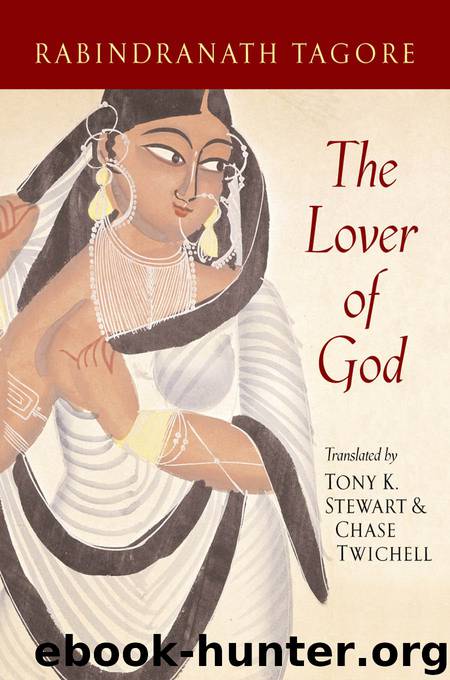The Lover of God by Rabindranath Tagore & Chase Twichell

Author:Rabindranath Tagore & Chase Twichell
Language: eng
Format: epub
Publisher: Copper Canyon Press
2. About Kṛṣṇa, Rādhā, and the Gopīs: Bengali Vaiṣṇava Poetry
The songs of Bhānu speak of the love of Kṛṣṇa, the Dark Lord, the cowherd lover of the young and guileless women of Braj. It is an old mythology, whose most prominent source is the tenth book of the Sanskrit Bhāgavata Purāṇa, which might have been compiled as early as the eighth or ninth centuries, but probably later; old Sanskrit texts are notoriously difficult to date because they are understood to be anonymous revelations of Truth rather than books with historical authors. The proper subject matter for this and other Purāṇas is the play of the gods. It is an activity whose point is often hidden from humans, who can only behold it as marvelous and awesome, in the old senses of those words. This activity is styled līlā, or play, a word that evokes the licking of flames, endlessly moving and brilliant, though unpredictable. The god most closely associated with this idea is Kṛṣṇa, the Dark One. He is Śyāma, that blackish emerald-blue-green color whose beauty and grace stagger anyone lucky enough to behold it. Those lucky ones today are his worshipers called Vaiṣṇavas, after one of his most ancient forms as Viṣṇu.
As far back as the Bhagavad Gītā, Hindu tradition has it that Kṛṣṇa descends to earth whenever the world languishes under the burden of sinful action, when humans lose sight of dharma, that is, of what is proper and good. The descent is called avatāra, an ancient Sanskrit word that is often wrongly construed as “incarnation,” when it simply means to cross down from heaven to earth, to appear or be manifest. The flesh is not involved, so there is no carnal tinge. But in one of the great ironies of this tradition, Kṛṣṇa’s actions as an adolescent are all about love—not some abstract or Platonic form, but the fleshy, lustful sort.
When he came to earth, Kṛṣṇa grew up in the region of Braj, in a village called Vṛndāvana, not far from the modern Indian city of Agra. He was raised by foster parents, Nanda and Yaśodā, who were affectionately indulgent. His early life was a giant frolic between cowherding duties and domestic chores; he and his brother played endless games with his cowherd friends and teased mercilessly the cowherd girls, called gopīs. His affairs with these girls speak to the pulsing heat of adolescence, bodies coming together in secret trysts, liaisons that risk for these young women a lifetime of opprobrium for the irresistible thrill of the moment.
The rainy season is the time for lovers, when the brooding landscape is suddenly fecund, reinvigorated from its desiccation brought on by the relentless heat of summer. It is especially during this season, when regular activity comes to a halt, that Kṛṣṇa calls the cowherd girls into the forest with the enchanting sound of his flute. The milkmaids can no more resist the temptation of Kṛṣṇa’s beckoning flute than they can follow him, when he leaves Braj, to the man’s
Download
This site does not store any files on its server. We only index and link to content provided by other sites. Please contact the content providers to delete copyright contents if any and email us, we'll remove relevant links or contents immediately.
| African | Asian |
| Australia & Oceania | Canadian |
| Caribbean & Latin American | European |
| Middle Eastern | Russian |
| United States |
The Universe of Us by Lang Leav(14386)
The Sun and Her Flowers by Rupi Kaur(13726)
Adultolescence by Gabbie Hanna(8155)
Whiskey Words & a Shovel II by r.h. Sin(7485)
Love Her Wild by Atticus(7239)
Smoke & Mirrors by Michael Faudet(5520)
Wiseguy by Nicholas Pileggi(4602)
The Princess Saves Herself in This One by Amanda Lovelace(4515)
Love & Misadventure by Lang Leav(4363)
Milk and Honey by Rupi Kaur(4235)
Memories by Lang Leav(4179)
Good morning to Goodnight by Eleni Kaur(3810)
Bluets by Maggie Nelson(3725)
Too Much and Not the Mood by Durga Chew-Bose(3701)
Algedonic by r.h. Sin(3510)
Pillow Thoughts by Courtney Peppernell(3419)
The Poetry of Pablo Neruda by Pablo Neruda(3375)
HER II by Pierre Alex Jeanty(3177)
Stuff I've Been Feeling Lately by Alicia Cook(3058)
